8 Aug 2024
How to Develop Custom Hospital Inventory Management Software: A Step-by-Step Guide
Matthew Connor
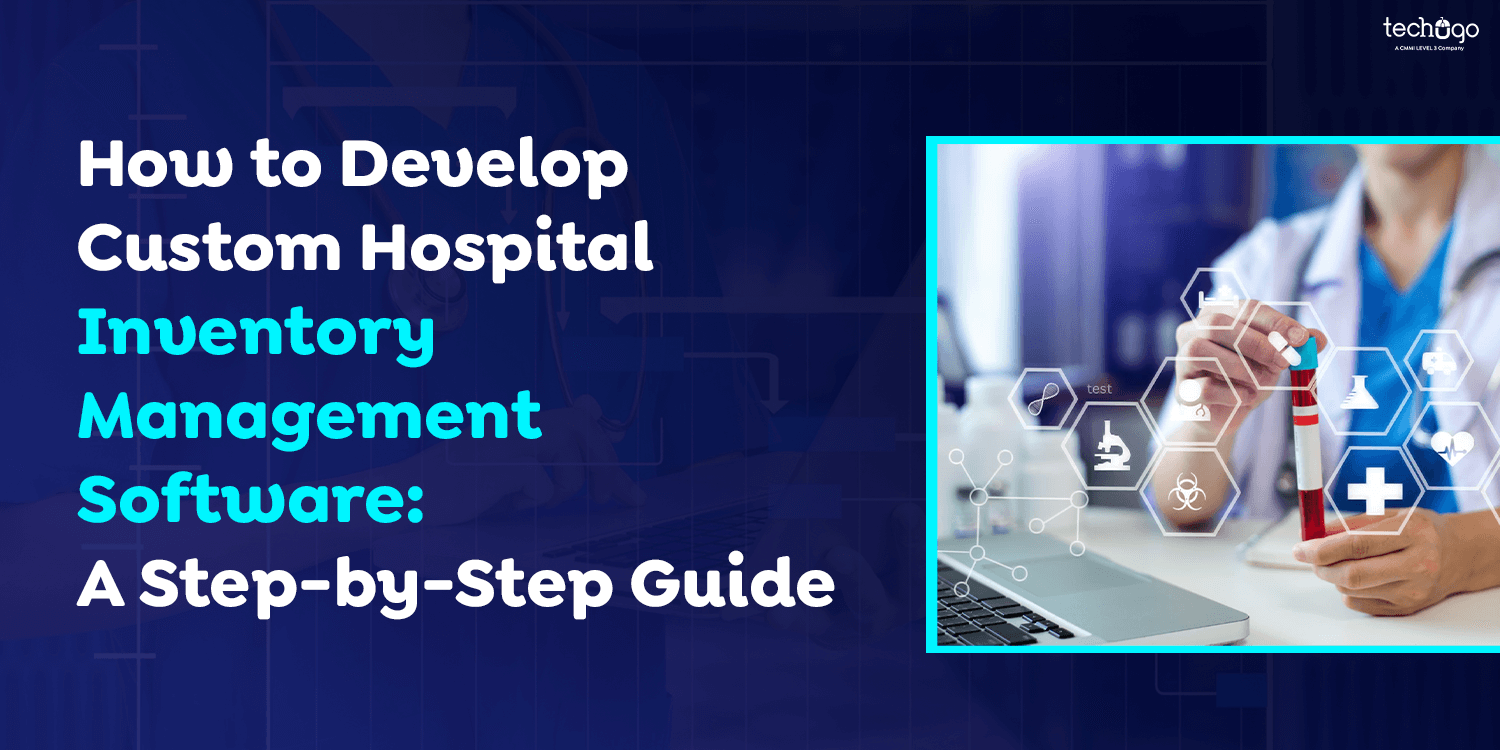
Software designed specifically to manage hospital inventory is an all-digital system that monitors and controls medical supplies, such as pharmaceuticals and supplies, and any equipment utilized within hospitals. A hospital inventory management software that assists hospitals in keeping accurate records about their inventory, monitoring usage patterns, and streamlining reordering processes is invaluable in streamlining operations. Real-time data and analytics allow for more efficient decision-making and resource allocation.
Attributing performance enhancement of hospitals requires making sure essential items are readily accessible to patients while reducing waste and expenses. In addition, this practice helps prevent overstocking or stockouts, which could reduce costs and improve patient outcomes.
This blog will outline the necessary steps to develop hospital inventory management software. Conduct an analysis to identify the specific requirements of your hospital and the various forms of inventory and personnel that need to be handled, in addition to planning for their workflow.
An intuitive interface enabling employees to monitor inventory levels efficiently ensures software is accepted and effective. Integrating hospital systems such as EHRs (Electronic Health Records) and accounting programs is vital to ensure smooth hospital operations. Compliance with regulations like HIPAA is also a top priority.
What Is Hospital Inventory Management Software?
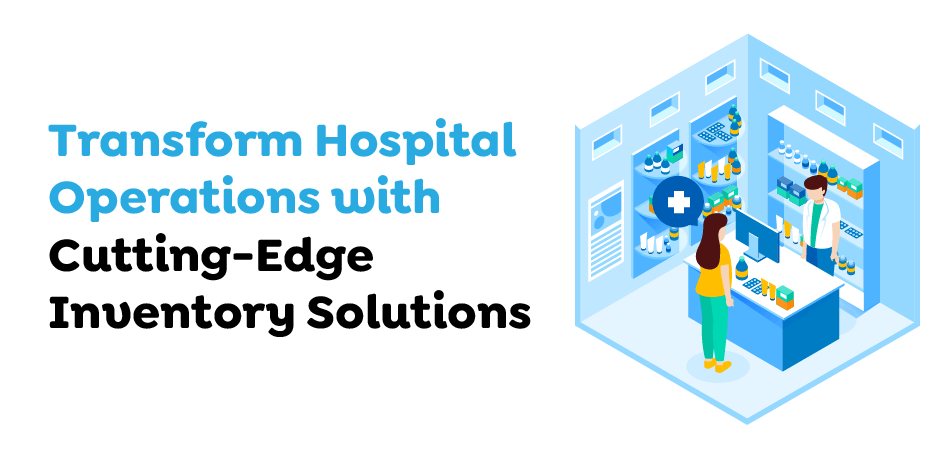
Healthcare inventory management software offers hospitals a complete system to help track and monitor medical equipment such as pharmaceuticals, personal protective equipment (PPE), and other essential devices. It was created to simplify inventory processes by eliminating manual effort and human error while automating reordering to ensure consistent stock levels are always present.
This program, with access to real-time information and sophisticated analysis capabilities, assists hospital administrators in making sound decisions regarding procurement, inventory control, and cost reduction.
Additionally, this hospital inventory management software offers alerts and notifications of imminent inventory outages, medicine expiration dates, or replenishing stock to avoid interruptions to patient treatment. Thus, this kind of software is integral to improving hospital operations by ensuring necessary items are always readily available for patient care delivery.
It could be integrated with various hospital systems – electronic health records (EHR) and financial management – to give an overall view of hospital operations and resource use.
Types of Medical Software
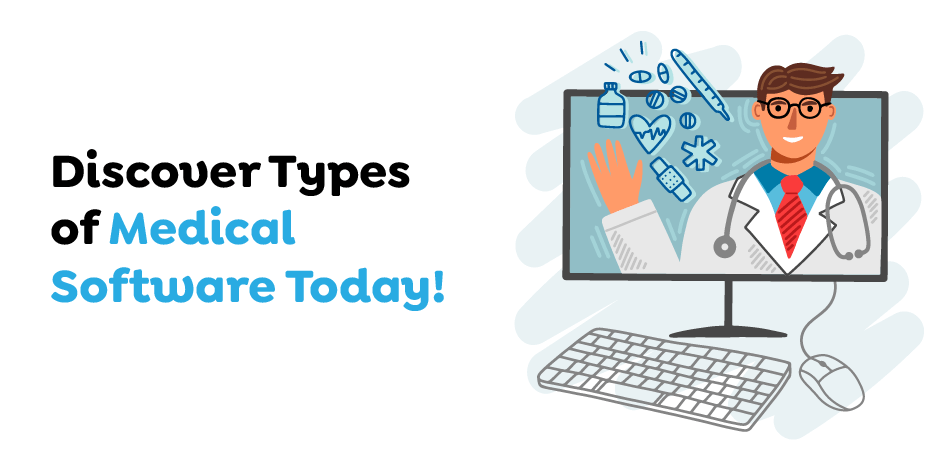
The selection of the appropriate medical software is among the most vital aspects of the medical field. The correct medical software can improve your service and increase the general quality and efficiency of the staff’s job.
However, medical personnel have a tough time choosing the appropriate medical software. The number of choices available makes it difficult for them to choose the best one. Here’s an overview of the most popular types of medical software.
EHR (Electronic Health Record)/ EMR (Electronic Medical Record)
The EHR can store information regarding patients, mostly the time, from various locations. The information could contain details about previous doctor visits or procedures they may have had in addition to other medical data.
Using EHR software is essential for a thorough assessment of a patient’s health status. However, many systems offer an overview for the medical and patient to inform all parties about the medical history.
Another crucial aspect to consider is that you may encounter phrases like EPR and EMR (electronic Medical Record Software). These are the kinds used in EHR systems. A variety of systems integrate the systems or offer them as distinct entities.
EPR refers to the secure storage of patient information on the local or remote cloud.
The phrase “EMR” (Electronic medical record system) refers to information regarding dosages and medications, prior procedures and planned ones, and health status throughout medical treatment.
Both systems provide crucial information storage for medical professionals. EHR systems are the most well-known and essential piece of software needed by hospitals. They are now seen as an integral part of the healthcare experience.
Healthcare CRM Software
CRM is the management of customer relationships. Terms such as “telehealth software” and “healthcare CRM” are often used interchangeably.
It’s a type of software companies use to control the services they offer their customers. Patients are the customers in the healthcare industry, whereas medical professionals are part of the business. Are you wondering about the benefits of the adoption of telehealth? Take a look at our article right now.
Healthcare CRMs are employed by healthcare practices and medical organizations to increase engagement with patients, improve access to patients, and increase the effectiveness of virtual treatments. With well-designed medical CRMs, providers can provide online telemedicine for patients.
Medical Billing Software
The medical billing software works like any other system that monitors billing data, with the exception that it’s designed for medical needs. It can track the amount of invoices, payments made in past installments, payments, and more. This allows hospital accountants to perform their jobs and keep the institution in top financial health.
Enable Healthcare Interoperability
Being a hospital administrator is a demanding job that requires a lot of time and energy. Therefore, to simplify the task for hospital administrators, hospital management programs were developed.
It offers users with tools to enhance their planning abilities and allows them to plan their schedules effectively. The system’s primary purpose is to arrange a patient’s appointment in a more convenient method and assign medical staff to every appointment. Hospital inventory management software can supply the medical professionals with vital capabilities, including:
- Text messages for patients
- Option to share files or images
- Daily updates for patients
- Security improvements
- Information for emergencies when needed
If you choose to spend money on hospital management software, you must select a program that is easy to use and comes with all-encompassing encryption. The software must also protect the privacy of your patient’s data and be easy to use across departments. Medical software providers can assist you by providing these functions.
E-Prescribing Software
Electronic prescribing software is precisely what it’s called. This type of medical software is utilized by experts in healthcare to deliver prescribed medications to pharmacies and provide pharmacy fulfillment services. Pharmacists can also receive messages and comments from medical professionals. Because of this, both parties are aware of the requirements for prescriptions, and the data is protected.
Telemedicine Software
Telemedicine is a very useful instrument for hospitals today and for technological advancements in healthcare. It permits medical practices that don’t have enough space to house all the medical personnel and their patients to manage their patients well. The efficacy of telemedicine relies on the software it is composed of.
Selecting the most suitable one requires thorough research, effort, and time. The first step is to find the right medical healthcare system equipped with the required functions and features, as well as consider the whole procedure of remote medicine.
The goal behind Telemedicine Software is to assist hospitals in overcoming the challenges they face in recruiting and retaining personnel. It also helps the hospitals by providing an efficient method of providing patients with services via remote access. It is simple to use and permits rapid communication between nurses, doctors, and patients with no restrictions.
Also Read – What Exactly is Virtual Healthcare? What Makes it Different From Telehealth?
Appointment Booking Software
The medical appointment program is software that enables patients to make appointments ahead of time and provides the patient with an extensive itinerary as well as all the necessary contact details they require. It also lets doctors determine which appointments are available and who will be scheduled to attend them and provides all the information on the appointment. It also assists in improving the hospital timetable and gives them more flexibility to manage their schedule.
Medical Device Software
Using software designed for medical devices, you can track the usage, maintenance, and storage of certain medical devices. Proper health system applications can also avoid missed maintenance and downtime. This software program will ensure optimal medical equipment use and inform you when you need to upgrade your equipment.
Medical Manager Software
The primary goal of the medical manager software is to ensure that patients’ experiences are effortless and easy. It also assists in reducing the quantity of paper doctors utilize as it guides them through the patient’s medical background. The data, which is crucial for patients and their medical providers, is stored on a single platform, simplifying the process for everyone involved.
These are the various types of healthcare software solutions that medical professionals may select with the professional assistance of medical software engineers. Let us now move to a different crucial aspect, i.e., the advantages of developing medical software.
Benefits of Hospital Management System Development
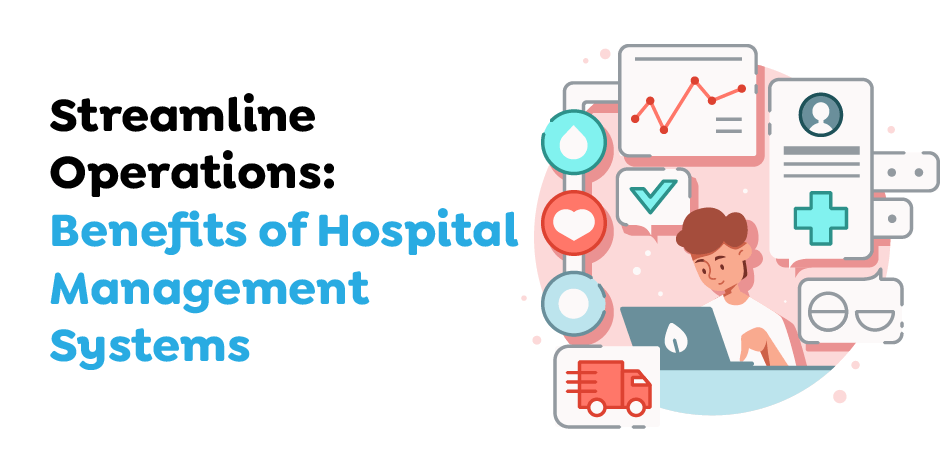
Here are some advantages of hospital inventory management software development; look below!
Enhanced Security of Data
Creating a hospital management system ensures the security and confidentiality of sensitive patient information. To protect against illegal access to data or breaches, it provides advanced control of access and encryption techniques and backup of data procedures. Patients can be ensured that their health data is handled safely and compliant with laws using an efficient HIS.
Flexibility and Scalability
A scalable HIS can allow for simple expansion to accommodate new departments and services or even process improvements as healthcare organizations change. Due to its adaptability, the hospital’s information management system can expand with your business without requiring major infrastructure or system modifications.
Round-the-clock Availability
Patients can access online assistance at all hours of the day through the clinic’s management program. The creation of hospital-management software will assist patients in emergencies and registration by providing contact information for ambulances nearby, covering the cost of a report, facilitating system navigation, and many more. With such a simple procedure, patients can enjoy great results.
Reduced Errors
It is expected to utilize a manual system that could be prone to mistakes. However, utilizing automated software for hospital administration speeds up the tracking process and lowers the possibility of errors. By using hospital management software, you can easily keep track of all facilities you have at your disposal, such as room occupancy and staff availability, as well as other operational information.
Additionally, the system is connected to the system so that once a patient has been released, the system immediately raises the bed number and staff availability.
Encourage Collaboration
By integrating the various people involved in a patient’s health care using a secure and solid platform, it is possible to ensure efficient contact and improve collaboration. The hospital management software allows for smooth and efficient communication, prompt input to improve diagnostic and treatment plans, and data in real-time, which improves patient outcomes.
Must-Have Features for Hospital Management Systems

Do you know the primary benefit of modern software? You can enable only the functions that are essential to run your business. You don’t have to spend money on extra features you won’t use. However, let’s look at the features that almost all inventory control systems must be equipped with.
Electronic Health Records and Patient Registration (EHR)
One of the key elements of a customized medical management tool is a CRM system that streamlines all usage cases involving patients communicating with different types of medical professionals within the clinic.
The system should keep as much information on the patient as possible to provide healthcare professionals with a more individualized treatment plan.
It’s also an excellent option for hospitals to share information about the patient’s consultation at multiple institutions regarding complaints, examination results, lab tests, treatment plans and outcomes, medical history, current status, evaluation, and so on. This permits doctors from different institutions to have a more thorough knowledge of the patient’s medical conditions.
Comprehensive Management of Treatment Plans
Physicians can create their treatment plans based on different protocols or use hospital administration software to make a diagnosis based on the ICD (International Classification of Diseases).
The hospital’s program utilizes an internal database of treatment results to guide suggestions on how to evaluate and treat patients according to the treatment management system protocols.
Processing Payments and Billing
When making appointments, all available services must be chosen simultaneously, and the software automatically determines the payment amount for each guest.
The customized hospital management software should track clients’ prepayments or debts regularly. The function of the system is to identify patients who have paid for services, and those who have to pay could be made available.
Inventory Control
A well-organized inventory management system is necessary to ensure the availability of medical supplies and prevent the unintentional shortage of essential items. The right software can provide tremendous assistance in this regard.
With the help of hospital inventory management software, employees can monitor the inventory, determine how many items are in stock, and decide when the next restocking will be needed. In addition, inventory management could help with keeping track of the medication’s date of expiration.
Efficient Laboratory Management
Every hospital’s management system requires lab management since it allows for much faster laboratory analysis results. The right software will allow easy access to all the lab data from one location and prompt alerts to patients and doctors about the analysis results.
The speed at which the analysis results are communicated to the doctor and patient is usually crucial to the effectiveness of the treatment and the client’s overall satisfaction.
Pharmacy Data Management
Document management software in hospitals’ management information system software could be used to record and track each individual’s Electronic Health Records (EHR) and Electronic Medical Records (EMR). In addition, the pharmaceutical data management system aims to incorporate changes and revisions related to billing and auditing requirements.
With the integration of healthcare automation, hospitals’ management systems can integrate pharmacies’ compounding capabilities and increase these capabilities to produce custom-made prescription packages for each patient.
The effectiveness of this strategy is vital to overall income production and to providing patients with a high-quality healthcare experience that meets their individual needs.
Step-By-Step Process Of Healthcare Software Product Development
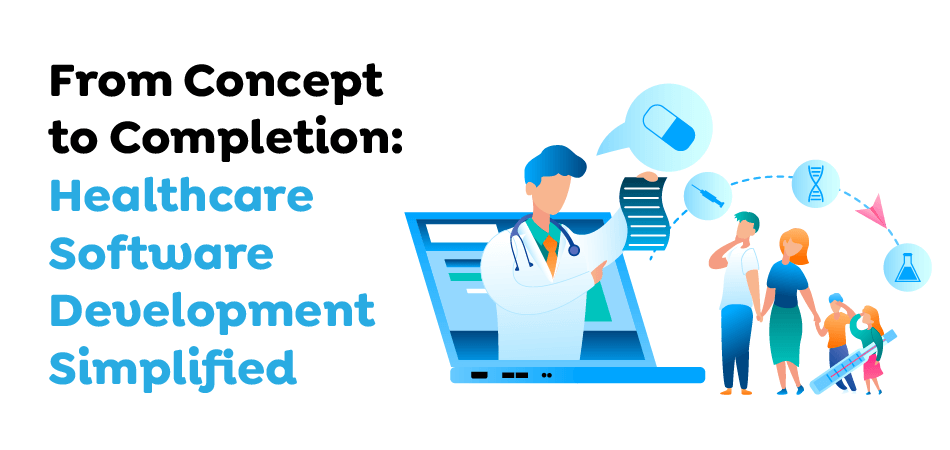
Let’s look at the development process of health software by conducting design, research, and deployment. This guide will give you all the details you require to overcome the unique challenges during the development process:
Identify The Need For The Software
Before beginning the process of establishing healthcare development services, it is crucial to comprehend the needs of the healthcare industry and determine the specific issues that the software can solve. This will require extensive market research, competitor analysis, and determining the requirements of healthcare professionals and potential clients.
Define The Requirements
After you’ve determined the program’s requirements, it’s time to decide on them. This includes capturing the program’s functions and features and developing an outline.
Create a Product Requirements document (PRD). This comprehensive document defines the requirements for the software. When deciding on requirements, include healthcare professionals, patients, and software developers while maintaining a broad perspective. Prioritizing the requirements according to their importance and relevance makes it easier to oversee software development for healthcare.
Design The Software
The design stage is focused on creating the outline for the software and comprises what is known as User Interface (UI), user experience (UX), and software architecture. This includes designing visual UI and UX models using wireframes and prototypes and then creating a robust and flexible design for the software.
Develop The Software
The development phase entails coding the program to the specifications and an accepted design. Best practices for coding and ensuring data security encryption and compatibility with other systems for health are observed. Comprehensive testing, such as integration tests, unit tests, system tests, and tests for user acceptance (UAT), is performed to determine and fix bugs and issues.
Deploy The Software
The program is installed in the desired environment, which could be a server, an internet-based platform, or even a mobile device. The next step is to deploy it on the market to test it in beta. The most important elements of this stage comprise setting up the environment for deployment, installing the software, and facilitating instruction classes for medical professionals and customers.
Maintain The Software
It’s essential to regularly maintain your software to ensure it works efficiently and securely. The feedback from doctors and users is collected to make improvements. Regular updates and support are provided to ensure the software stays up-to-date with the latest techniques and guidelines.
Evaluate The Software Performance
Evaluation is the process of evaluating software’s efficiency. It also includes assessing the effects on patient care and health-related processes for healthcare providers, as well as the organization’s overall performance.
Cost of Healthcare Software Development in 2024
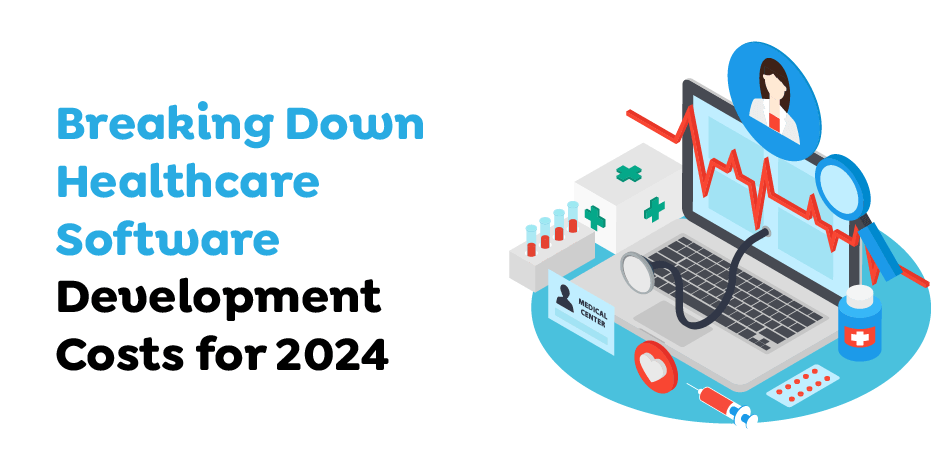
The healthcare sector’s software development cost can differ in response to many variables. The order of the elements that affect the price can be summarized as follows:
Features and Complexity of the Project:
The obvious thing is that simple programs that are easy to use are less expensive than sophisticated systems that can perform various capabilities. For instance, you can expect a health tracking app to have a budget of less than $10,000, while a fully-fledged EHR system might cost millions.
Team Expertise:
The members of your team who are skilled and experienced can have a huge influence on the development costs. A team of highly skilled health software engineers costs more than a team that includes general programmers.
Technology Stack:
The kind of technologies used in the development of software could also affect the price. The latest technologies, with capabilities of AI and machine learning, could result in higher costs than traditional development tools.
Regulation Compliance:
Software for healthcare is subject to regulations that ensure the security and protection of patient information. The regulatory requirements can increase the development time and, in turn, the cost associated with the undertaking.
Placement and outsourcing:
Positions can affect the team’s rate of development. Outsourcing applications to lower development costs in other countries can save money. However, quality and language control concerns become crucial aspects to consider.
To assist you in this, here’s an estimate of the healthcare development of software:
- Basic App Development: $8,000 – $20,000
- Mid-Complexity Software: $50,000 – $150,000
- Complex Enterprise Systems: $250,000 and more
Keep in mind that these estimates are only approximate. To get more precise information about setting up the medical software program, talk with seasoned companies for healthcare software development. They will provide you with an individual quote based on the requirements you have provided.
The Future of Healthcare Software Development
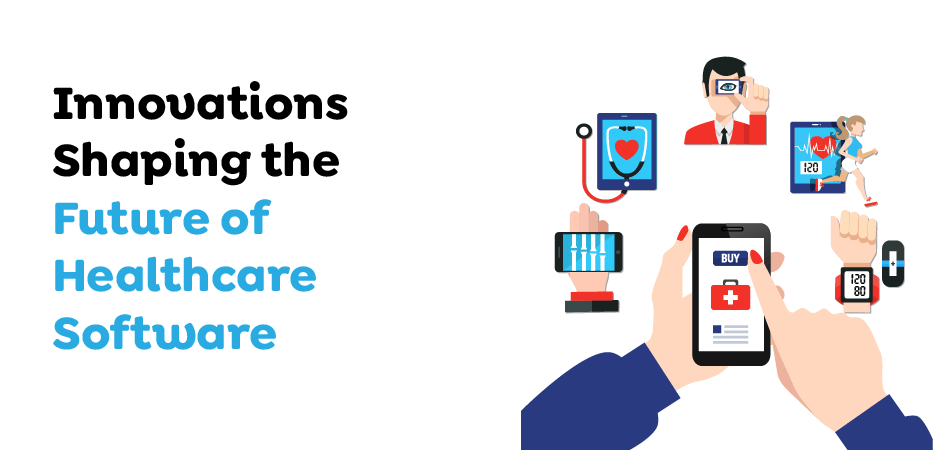
Healthcare software development is on the right track and could transform patient care and the healthcare industry. The future of healthcare software looks like this:
Deeper Integration of AI:
- Artificial Intelligence-Powered Diagnostics and Treatment: AI will not be limited to processing medical or CT/X-ray reports. It will also anticipate the progression of disease and provide the most efficient treatments with greater accuracy.
- Artificial Intelligence-driven Drug Discovery: AI will play a more significant role in searching for drugs, modeling interactions between potential drugs, and reducing the time needed to create essential medicines.
- Artificial Intelligence-powered Virtual Assistants: Artificial Intelligence-based virtual assistants will grow to more advanced levels of intelligence, assist patients daily with individual healthcare advice, and guide patients to preventive healthcare.
The Rise of Precision Medicine:
Healthcare software will lead us into an era of AI, and Big Data analysis will transform medicine. This method keeps genetic information at the forefront of the patient’s lifestyle and medical history, resulting in more accurate and effective treatments.
Also Read – AI in Mental Health: Discover the Challenges and Opportunities
The Continuous Development of Telehealth:
Blockchain for Secure Data Management:
Blockchain technology’s application to healthcare data management could transform this field. It takes data security to a new degree, offering greater data integrity, increasing patient data ownership, and making data sharing easier between healthcare providers.
The Focus on Preventative Care:
Hospital inventory management software will be occupying an upper position in the field of preventive healthcare. AI-based risk assessments and patient-focused instruments for managing health will help patients get closer to their health through an active approach and reduce the burden on healthcare institutions.
The Growing Importance of Interoperability:
The smooth data transfer between Healthcare IT technology platforms will become even more important. Key indicators will include interoperability and open-source standards options, enabling healthcare professionals to better understand patient data and make better decisions.
The Ethical Considerations of AI in Healthcare:
With AI’s ever-growing influence, it is becoming more difficult to agree on ethical issues like bias in algorithms. Ensuring patients’ privacy is essential. Transparency in healthcare practice and controls are essential elements for winning the public’s trust in AI-driven healthcare systems.
Also Read – How AI is helping the entire healthcare industry ?
These are just ideas of the many other possibilities that can be discovered by developing healthcare software. The captivating world of technology is bringing numerous new solutions capable of stopping patients from growing and, consequently, improving the quality of healthcare and the overall health of every person.
Why Choose Techugo for Developing Hospital Inventory Management Software?
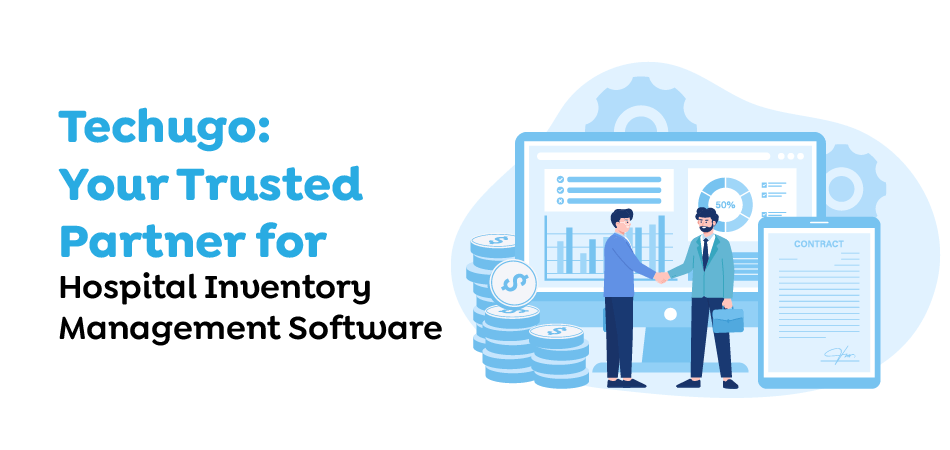
Selecting Techugo for creating hospital inventory management software provides you with support from a team of highly skilled developers who have expertise in creating robust, user-friendly, and scalable solutions tailored to the special requirements of healthcare facilities. Techugo’s expertise in incorporating cutting-edge technologies such as AI and machine learning allows real-time monitoring and analytics, guaranteeing optimal stock levels and efficient resource allocation. With a strong focus on compliance with healthcare regulations like HIPAA, Techugo, a mobile app development company in Canada guarantees the security and confidentiality of sensitive patient and inventory data. Their dedication to providing intuitive interfaces and seamless integration with existing hospital systems improves operational efficiency, reduces costs, and improves patient outcomes, making Techugo the ideal partner for changing hospital inventory management.
Conclusion
Creating hospital inventory management software before 2024 is like assembling an intricate puzzle. First, you determine the layout by consulting with doctors and nurses. Afterward, you must follow guidelines and rules to ensure puzzle pieces are joined correctly. Following that, you connect the puzzle pieces, playing every step until you are sure everything goes smoothly. Once you have completed the puzzle, you connect it to the computers in the hospital and instruct patients on how to use it.
The puzzle must be completed! Continue to take notes from your puzzle and make adjustments to improve its effectiveness. If pieces of the puzzle disappear and you must locate them, you’ll be there to solve the issue. Thus, creating healthcare software can be described as adding a crucial piece to the puzzle that helps physicians and nurses do their jobs more effectively.
Get in touch with us today to transform your vision into reality!
Get In touch
We are excited to here from you and let’s start something special Together. Call Us for any inquiry.
Write us
sales@techugo.caJust a call away
About you




